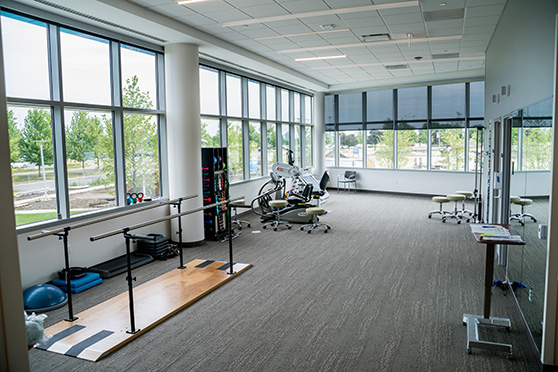Physical Rehab Services at NCH: The road to recovery
May 28, 2020

When you hear that someone is hospitalized with COVID-19 you know they are experiencing a serious illness. The Centers for Disease Control and Prevention tells us people with high risk for severe illness related to COVID-19 include those over 65, those living in nursing homes and people with underlying medical conditions like chronic lung disease or asthma, serious heart conditions, morbid obesity, diabetes, chronic kidney disease undergoing dialysis, liver disease and those with a compromised immune system.
These patients have a more difficult time fighting COVID-19 and this often leads to a longer hospital stay, which may include time on a ventilator to assist with breathing.
None of this information is new to anyone who has been following stories in the news. However, we often don’t hear what happens to patients on the road to recovery, as they get ready to discharge and are released to go home.
COVID-19 can affect people in different ways. Some may only experience physical deficits such as weakness, decreased range of motion and endurance, while others experience more subtle impairments such as difficulties with concentration, memory, speech or swallowing. These can be caused by the effects of the virus itself as well as consequences of long-term ventilator use.
Regardless of the diagnosis, any patient who spends an extended length of time in the hospital often requires the need for rehabilitative services including physical, occupational and/or speech therapy. We are seeing those discharged after contracting COVID-19 have a particularly strong need for such services to allow them to more fully regain their strength and independence. Physical and occupational therapy may work to increase functional strength, balance, endurance and range of motion for the arms, legs and core, and often includes practicing important skills like safely transferring in and out of a chair, gait training (walking) and regaining the fine motor skills for tasks such as writing or holding an utensil. Our Physical Rehabilitation Therapy team also assists patients with some basic activities of daily living that are essential for return to their pre-hospital level of independence, including toileting, bathing/showering, grooming, dressing, meal preparation and eating/feeding.
Finally, patients who spend time on a ventilator will require some speech-language services. This work may be focused on improving speech articulation, language, comprehension, swallowing skills for safe nutrition, or improving cognitive skills such as memory, concentration and problem solving.
Fortunately, our team offers comprehensive and highly skilled physical, occupational and speech therapy to address all of these needs in several settings, including:
- Intensive Care / Acute Care hospital
- Inpatient Acute Rehab Unit
- Home Care Services
- Outpatient Therapy Services at eight distinct locations
- Outpatient Day Rehab Services, particularly helpful for those discharged to home that need more intensive rehabilitation, typically three to five times per week; these patients can receive physical, occupational and speech therapy with support from nursing and a rehabilitation physician (physiatrist)
Some patients cared for in our hospital have recovered from COVID-19 and have seamlessly transitioned from each of these programs and services in order to maximize their recovery.
Being a community hospital, we understand how important it is to offer convenience for our patients. In fact, we bring physical therapy services to eight outpatient locations throughout the northwest suburbs. Our Rolling Meadows Outpatient Care Center offers physical, occupational and speech therapy as well as our Day Rehab Program. Patients can also find physical therapy services at the following locations: Arlington Heights at the NCH Wellness Center and 1051 West Rand Road, and at our outpatient care centers in Buffalo Grove, Kildeer, Mount Prospect, Palatine (on the Harper College campus) and Schaumburg.
For more information about our physical rehab options, call 847-618-3700.
Special thanks to NCH Rehab Services Director Jerry Bragg and Manager Julie Schauble for help with this article.